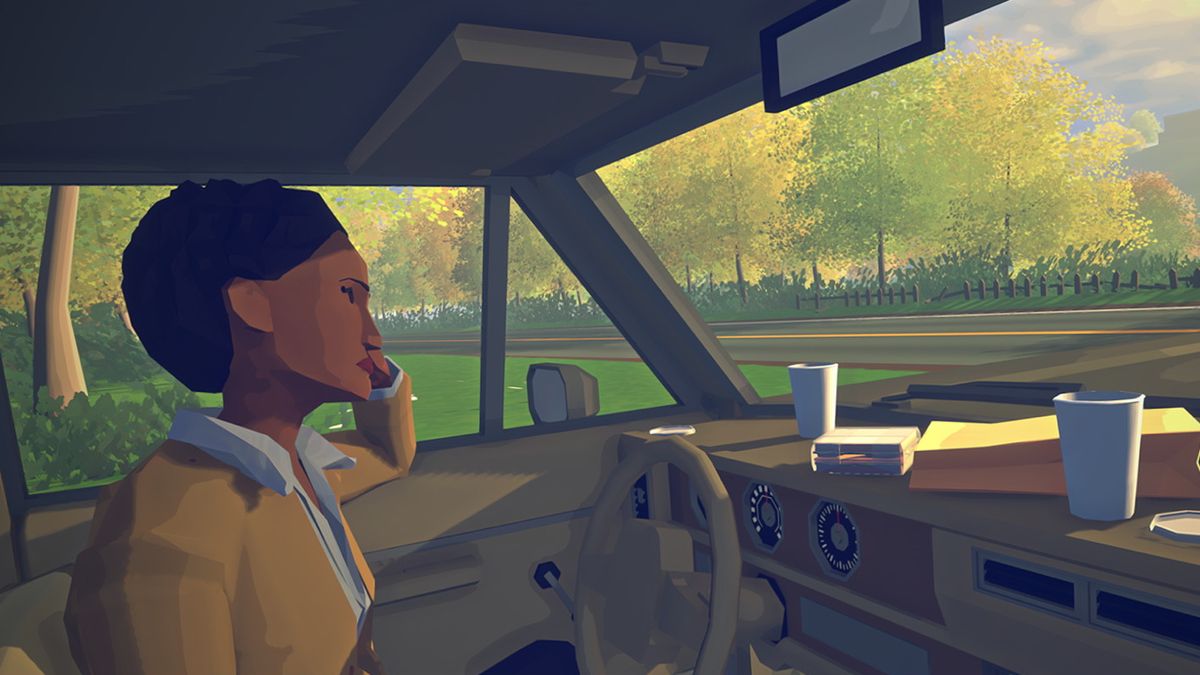If words are cheap, the makers of Virginia are the richest of all, telling a gorgeous story without dialogue

In classical Latin, an ‘expression’ denotes an action of ‘pressing out’, or of a ‘projection’. In late Latin, it also represents ‘vividness’. It was only in the 15th century that ‘expression’ became synonymous with ‘putting into words’. This is a shame because too often, expression is only seen as the act of speaking. In cinema and games, characters must say how they feel because how are we expected to know otherwise? The only expression that really counts is the kind that comes wrapped in quotation marks.
The debut game from Jonathan Burroughs eschews this obvious form of expression, creating a mysterious, multilayered narrative with a complete absence of dialogue. Instead of what characters say, it becomes what they don’t. And instead of the words that come out of their mouths, it becomes a nuanced study of body language, facial features and what simmers quietly beneath the surface. It’s a bold move in a culture that relies on dialogue as a tool of understanding.

At the time of its release, Virginia was divisive: tantalising critics who applauded its similarities to Twin Peaks and art-house style of storytelling, while alienating players who found it long-winded and pompous. But beneath Variable State’s arguably contrarian approach to video games is an experience you won’t find elsewhere.
When Virginia begins, we’re introduced to the main character, Anne Tarver, during a formative moment: she’s about to graduate from the FBI Academy to become a fully fledged agent. From a single scene, we know she is riddled with doubt and insecurity. But how? All we have is her blank expression as she stares into a mirror and puts on her lipstick. But there is much to unravel. Make-up means artifice. The act of applying make-up could be like putting on a mask, either for protection or to try to convince others she is someone else. It’s curious that on a day where she should be celebrating, Anne lingers in the bathroom, alone and dejected.

In the next scene, it’s years later and Anne is travelling from Virginia to investigate the disappearance of a young boy in the town of Kingdom. Despite the jump in years, the game is perfumed with loneliness. We know from Anne’s empty, airy apartment that she lives alone. Her rumpled bed exists for one person, and she navigates every location alone, whether it’s a long ride in an elevator or a slow descent to a carpark.
In a game without words, every object is ripe with symbolism. A locket with a picture inside becomes armour, of guarding someone against our heart. The recurring image of a dead bird becomes about fragility; the death of innocence. And the pursuit for a lost child becomes about the search for self. Colours, which typically denote emotion, also have a role to play. Anne believes something is bubbling in Kingdom, a mystery that is as red as blood and fierce as rage, which is pierced with an ice blue: a melancholy that tinges every scene.

For the investigation, Anne is paired with an older and more experienced agent, Maria Halpernin. A brittle enigma who treats Anne frostily, she reluctantly begins to thaw as friendship develops. Anne and Maria are two misfits who over the course of the game become a single entity. Their relationship isn’t sexual but it is intimate, their feelings unfurling in small, tight spaces like basements and cars. Driving back and forth to Kingdom means being in a state of constant transit, and so each woman becomes the other’s constant. Their cocoon is shattered, however, when Maria discovers Anne has been investigating her: a betrayal that cracks them in two. What is fractured cannot be brought together again.
Sign up to the 12DOVE Newsletter
Weekly digests, tales from the communities you love, and more
This relationship becomes the silent but pulsating heart of Virginia. And the lack of words between the two women is telling. You get the impression that bruises bloom where their tongues should be: they can’t speak because if they could, they’d be screaming.

Expression, then, isn’t what these characters say, but what their actions reveal. The state of Virginia itself is an expression: not a land mass but a metaphysical land of wishes, dreams, longing and regret. Accentuated by Lyndon Holland and his gorgeous soundtrack, Anne fills the landscape with how she feels, and it ripples around her with tumultuous force.
Despite a staunch divide in opinion, critics and players loved to pick apart Virginia’s final act, where present and future crash together in an extended, dreamlike sequence. It’s striking, yes, but it’s the quiet moments that sing: the recurring image of a clock ticking down a life, an apartment that ripples with loneliness, and everyday objects that become portals into the heart.
This article originally appeared in Xbox: The Official Magazine. For more great Xbox coverage, you can subscribe here.
Kimberley Ballard is the former Production Editor of SFX, T3, and Official Xbox Magazine, and was once the Communications Manager of Future Plc. Kimberly left the business in 2020 to pursue a job in the video game industry; she is currently stationed at Creative Assembly, where she works as an Associate Brand Manager for the Total War series.
Most Popular



